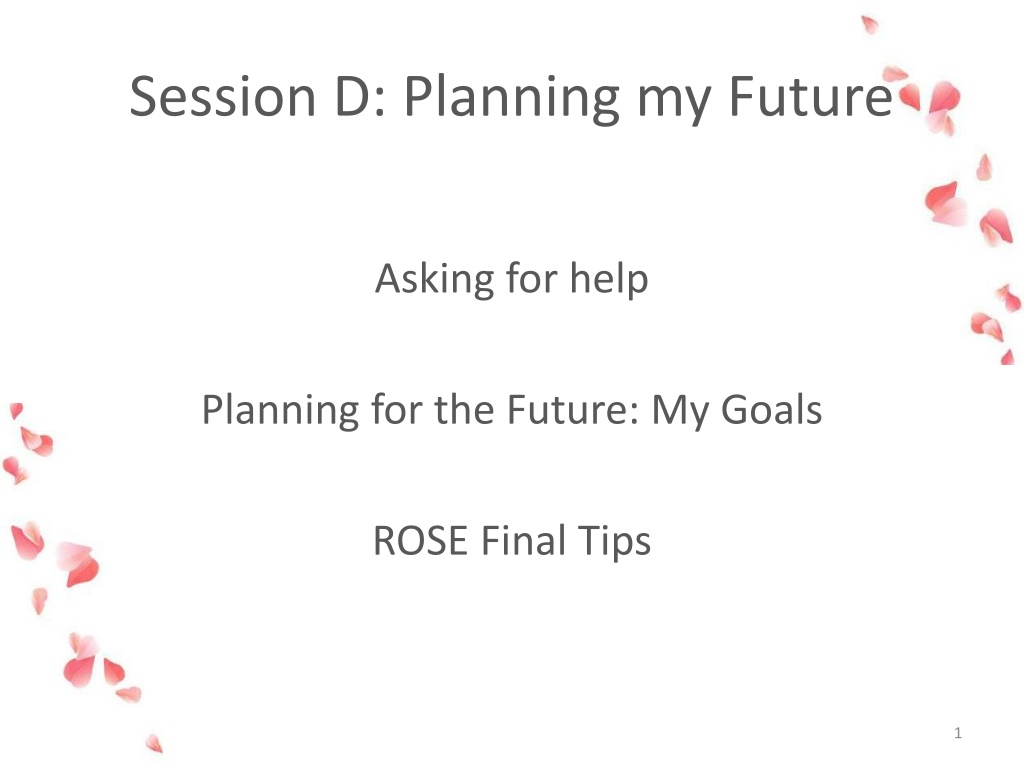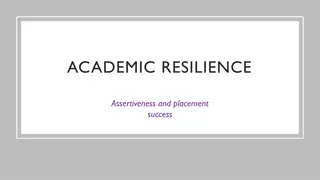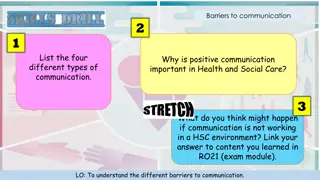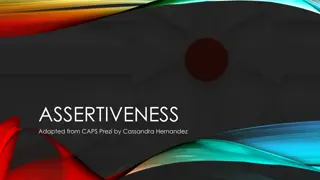Empowering Women: Assertiveness Training and Overcoming Barriers
This content discusses assertiveness training for women, focusing on communication skills, handling interpersonal disputes, understanding assertive behavior, and overcoming barriers to assertiveness. It emphasizes the importance of women asking for help when needed, challenging societal expectations, and promoting self-empowerment. The session provides practical tips and insights to help women communicate effectively, navigate difficult situations, and assert their needs confidently.
Download Presentation

Please find below an Image/Link to download the presentation.
The content on the website is provided AS IS for your information and personal use only. It may not be sold, licensed, or shared on other websites without obtaining consent from the author. Download presentation by click this link. If you encounter any issues during the download, it is possible that the publisher has removed the file from their server.
E N D
Presentation Transcript
Session D: Planning my Future Asking for help Planning for the Future: My Goals ROSE Final Tips 1
Session D Assertiveness Check-in how woman did with her assertive request (conduct communication analyses-ask for a word by word account) Trouble shoot with her if any problems Normalize if difficult for woman Remind her that she has the right to ask Remind her that just because she asked assertively does not mean person will say yes (person has right to say no) 2
Potential Difficulties Interpersonal Disputes Woman s does homework on assertiveness and reports that her partner became angry Ask for a detailed account, especially request, her tone, her non-verbal, how many requests or accusations were made, use of positive statements. Use example from another participant- This reminds of another women I was working with whose partner became very angry when she tried to ask him to watch their baby while she was cooking. She had approached him when he came home from work and decided to try it again but this time on his day off from work after he came home from spending time with his friends and was always in a good mood. 3
Session D Review Assertiveness What is assertiveness? Remind her that people around her might not know what she needs Importance of communicating those needs Compare assertiveness to nonassertive and aggressive behavior Nonassertive- you do not express your own want, needs or ideas. You ignore your own rights. Ask What happens when you are nonassertive? Aggressive- expression of needs and feelings at expense of others. You violate another persons rights Ask What happens when you are aggressive? 4
Session D Barriers to being assertive Not always valued in women in different cultures, Fear of retaliation and conflict, Lack of knowledge of assertiveness as a skill, Fear of being called mean or selfish, Fear of losing the relationship, Beliefs that we do not deserve what we are asking for or should be able to handle the situation ourselves, Not being ready to hear no or face that relationships are not repairable, Lack of trust in yourself. Practice and Prepare will help break these barriers 5
Asking for Help: Who, Me? Needy? Our society has put women in a position to think that they must do it all. Supermoms, in reality, are few and far between. Carol Asking for help brings up feelings of failure. Tammy 6
Asking for Help: Who, Me? Needy? For the first time, I realized I needed help. Laurie You never know what kind of reaction you will get. My mom said, you just have to deal with it. This attitude just shuts people down. Gaye 7
Session D Saying NO New baby, new demands on top of old demands. Need to thin what is important to you (priorities) Sometimes will have to say No to take care of yourself Ask: How hard is it for you to say NO to a request Remember, you have the right to say no. You cannot be everything to everybody. As a new mom, there will be some things that you used to do for others that you will not be able to do with the added responsibilities of a baby. 8
Session D Saying NO If unsure or do not have courage to say no delay but get back to person (e.g., let me see what else is going on and I will get back to you tomorrow ) If you want to help but cannot do it at that time or asked to do too much, can tell person to ask you again or make a counter offer (e.g., I cannot babysit for you tomorrow but next week Tuesday or Wednesday I am free and be happy to babysit then ) Say no but find alternatives (e.g., I cannot make Gran so many meals each week, but why don t you look into meals on wheels) Broken record. Keep repeating no when person is not listening, refuses to take no for an answer, or person keeps arguing 9
Session D Role playing saying NO Ask for examples of times when women would have liked to say no but didn t Ask why it is hard (lack of skill, fear of appearing selfish, wanting to be liked for everyone, wanting to appear to handle everything, fear of retaliation or peace-keeping) Problem-solve how to say no Can also use examples that are applicable to the woman s life or future once baby is here Remind women of the importance of letting those around her know what she needs Family and friends might not offer you the type of support you need or they might not be around because they worry they are intruding 10
Session D Goal setting When having a baby your whole life can shrink around diapers, feeding time, burping time, bathing time, laundry. People are happiest when they have dreams, hopes.. Setting goals is a buffer against depression Ask women what are some of your hopes, dreams, goals? Remind women that infancy does not last forever Set realistic long-term and short-term goals Emphasize baby steps. (eg cleaning an apartment can be overwhelming but start with one room/closet, one area at a time) Work through an example (if needed, refer to how other women s suggestions or build on something a woman might have told you. For example, she wants to go back to school) 11
HOLD ON TO YOUR DREAMS INFANCY DOES NOT LAST FOREVER! 13
Session D Review Review handout on ROSE Final Tips If time complete handout on my resources Remind woman to practice skills learnt Remind woman that you will be seeing her after she delivers her baby (or within the next month if she has delivered) 14
Rose Final Tips PLEASANT ACTIVITIES RELAXATION Remember it is important to nurture yourself, and to develop new ways of doing so (if necessary). Adding in positive activities can lessen distress and increase your energy and positive outlook. Remember your pleasant activity contract. Learning how to manage stress will make you feel better, increase your sense of control, and empower you. Remember to do your relaxation exercises. take time out for YOU. Rest means rest (no chores). CHANGES: BECOMING A NEW MOM Big changes in life, like having a baby, can be stressful. Becoming a new mom involves new demands and losses. You may feel fearful, sad, tense, & frustrated - remember you are not alone and you re not to blame. It is important to talk about your feelings, reach out. It is important to replace lost goals when experiencing losses and changes in life. There are both short-term goals (baby steps) and long-term goals. Set ongoing goals. (Infancy does not last forever). 15
Rose Tips Remember Celebrate your efforts and successes. Give yourself credit even for the small things that you do as a partner, daughter, friend, sister or soon to be mother DEALING WITH RELATIONSHIPS You have the right to ask for help and the right to say NO. Relationships need constant work, especially when there are changes like having a new baby in your life. Maintain balance in your relationships - demands must not outweigh your needs. 16
Certificate of Completion Awarded to: for successfully completing the ROSE Program Presented on: By: 17
My Resources When I am feeling down or overwhelmed, I can reach out to the following people/resources: NAME: 1.__________________ PHONE NUMBER: 1. __________________ 2.__________________ 2._________________ 3.__________________ 3._________________ 4._________________ 4._________________ 5.__________________ 5._________________ *Remember to use this sheet as a reference if you are feeling overwhelmed or need assistance.* 18























